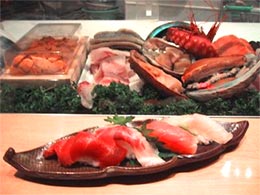
 ecent months have bid sayonara to Chinese and Thai eateries, with foodies opting for dangerous dining.
ecent months have bid sayonara to Chinese and Thai eateries, with foodies opting for dangerous dining.
At a growth rate of almost 200 percent, if one thing grew faster than India's one-billion plus in 2004, it was the number of restaurants for the hungry masses.
Traders and builders, halwais and celebs, NRIs and novices, all jostled to put up their pots and pans and pour in serious money to feed India's growing hunger for newer, slicker flavours.
The hunger only grew, even when the one thing that exceeded the restaurants' mushrooming was the rate of their shutting shop.
However, in the line-up of some different, many indifferent, places, a few stood out and got the foodies excited.
If 2004 marked a watershed, it was over overcooked, masala-laden food.
We discovered a whole new world of textures, colours and flavours untrammeled by dhania powder.
'Fresh' became the buzz word and our biggest breakthrough was eating raw.
Sushi has to be 2004's big story.
India hopped off the Chinese-Thai bandwagon, ditched manchurian and manchow and discovered subtler aesthetics further east.
At Threesixty, Delhi, Chef Augusto's sushi bar is a legend. There is an extensive selection of world cuisine on offer, but the sushi outshines everything -- the wood-fired oven, and what is surely the country's most spectacular wine cellar.
In Mumbai, the fish capital, the taste for the raw is more pronounced. Sushi sells at Wasabi (the carefully hidden Taj restaurant).
Real connoisseurs also talk about the Rs 8,000 a platter sashimi!
Fish -- flown in fresh from Tokyo -- includes varieties such as the Black Cod, "Unknown", as Camellia Punjabi, foodie high priestess, says, "outside Japan."
On the other hand, Indian cuisine was the big loser.
There were no heavy curries and kebabs, one reason being the diners' obsession with calories. Low fat cuisines (Japanese and Mediterranean) buzzed, there were attempts to dish out 'spa' menus, and, unsuccessfully, 'less heavy, modern Indian' ones.
Olive-oiled kebabs didn't click.
But since half the populace is on the South Beach diet and the other on Shikha Sharma's, this is a trend that will grow.
Chennai in particular took its health seriously with Citrus, Karen Anand's restaurant.
With the invasion of the money-pumping NRI and the heavyweight industrialist, mom and pop restaurants became invisible. We had 'ship' restaurants and 'bed' lounges, gimmicks, glitzy publicity, but often confused food.
In Jaipur, the lounge made an appearance on a train -- Steam, at Rambagh Palace, with a bar where the platform chai [shop ought to be.
In Delhi, Olive qualified as the best looker and was sufficiently awarded, the charm of its garden picnics overriding overrated pizza. Celebs adopted the place, just as they did with Shalom, first to introduce both Sangria and the all-white decor to Delhi.
In a year when everyone wanted celebrity, television chef Sanjeev Kapur engaged Chandigarh with his Yellow Chili.
Mumbai was unimpressed by Tendulkar's but, then again, some celebs are more equal than others.
Sourav in Kolkata, for one. You may question the wisdom of a coffee shop called One Day, and an 'all-veg family' restaurant in these days of experimentation, but Sourav's in Cal buzzed alright.
Above all, there was nothing like celebrity to pep up a place.
Whether it was Saif Ali Khan with girlfriend Rosa (at Mumbai's Olive) or Shahid Kapur and Kareena Kapoor at Rain, Mumbai, they were abuzz and not merely because of their food and beverages.






